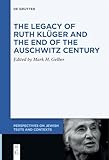The Legacy of Ruth Klüger and the End of the Auschwitz Century / ed. by Mark H. Gelber.
Material type: TextSeries: Perspectives on Jewish Texts and Contexts ; 20Publisher: Berlin ; Boston : De Gruyter, [2022]Copyright date: ©2022Description: 1 online resource (VIII, 190 p.)Content type:
TextSeries: Perspectives on Jewish Texts and Contexts ; 20Publisher: Berlin ; Boston : De Gruyter, [2022]Copyright date: ©2022Description: 1 online resource (VIII, 190 p.)Content type: - 9783110629699
- 9783110793277
- 9783110793239
- online - DeGruyter
- Issued also in print.
| Item type | Current library | Call number | URL | Status | Notes | Barcode | |
|---|---|---|---|---|---|---|---|
 eBook
eBook
|
Biblioteca "Angelicum" Pont. Univ. S.Tommaso d'Aquino Nuvola online | online - DeGruyter (Browse shelf(Opens below)) | Online access | Not for loan (Accesso limitato) | Accesso per gli utenti autorizzati / Access for authorized users | (dgr)9783110793239 |
Frontmatter -- Acknowledgements -- Contents -- Introduction – The Legacy of Ruth Klüger and the End of the Auschwitz Century -- Poetry and Naming in Ruth Klüger’s Works and Life -- Spannung: Remarks on a Stylistic Principle in Ruth Klüger’s Writing -- Speaking with Germans: Ruth Klüger and the “Restitution of Speech between Germans and Jews” -- Writing Auschwitz: Jean Améry, Imre Kertész, and Ruth Klüger -- “. . . but the dead set us certain tasks, don’t they?” Ruth Klüger and the Jewish Tradition on Women Saying Kaddish -- Ruth Klüger, Judaism, and Zionism: An American Perspective -- “Ver zenen mir?” Children’s Voices in the Poetry of the Shoah -- “Looking into a Mirror Instead of Reality.” Ruth Klüger and the Problem of Holocaust Tourism -- Threads Yet to Be Spun: A China Angle on Memory and Ghosts in the Poetry of Ruth Klüger -- Notes on Contributors -- Index
restricted access online access with authorization star
http://purl.org/coar/access_right/c_16ec
Ruth Klüger (1931 – 2020) passed away on October 5, 2020 in the U.S. Born in Vienna and deported to Theresienstadt, she survived Auschwitz and the Shoah together with her mother. After living in Germany for a short time after the War, she immigrated to New York. She was educated in the U.S. and received degrees in English literature as well as her Ph.D. in German literature at the University of California, Berkeley. She taught at several American universities. She has numerous scholarly publications to her credit, mostly in the fields of German and Austrian literary history. She is also recognized as a poet in her own right, an essayist, and a feminist critic. She returned to Europe, where she was a guest professor in Göttingen and Vienna. Her memoir, entitled weiter leben (1992), which she translated and revised in an English parallel-text as Still Alive, was a major bestseller and highly regarded autobiographical account of a Holocaust survivor. It was subsequently translated into more than a dozen languages. It has also generated a vigorous critical discussion in its own right. Ruth Klüger received numerous prestigious literary prizes and other distinctions. The present volume, The Legacy of Ruth Klüger and the End of the Auschwitz Century, aims to honor her memory by assessing critically her writings and career. Taking her biography and writings as points of departure, the volume includes contributions in fields and from perspectives which her writings helped to bring into focus acutely. In the table of contents are listed the following contributions: Sander L. Gilman, "Poetry and Naming in Ruth Klüger’s Works and Life"; Heinrich Detering, "’Spannung’: Remarks on a Stylistic Principle in Ruth Klüger’s Writing"; Stephan Braese, "Speaking with Germans. Ruth Klüger and the ‘Restitution of Speech between Germans and Jews’"; Irène Heidelberger-Leonard, "Writing Auschwitz: Jean Améry, Imre Kertész, and Ruth Klüger"; Ulrike Offenberg, "Ruth Klüger and the Jewish Tradition on Women Saying Kaddish; Mark H. Gelber, "Ruth Klüger, Judaism, and Zionism: An American Perspective"; Monica Tempian, "Children’s Voices in the Poetry of the Shoah"; Daniel Reynolds, "Ruth Klüger and the Problem of Holocaust Tourism"; Vera Schwarcz, "A China Angle on Memory and Ghosts in the Poetry of Ruth Klüger."
This volume honors the memory of Ruth Klüger by assessing critically her writings and career. Taking her writings as a point of departure, it includes contributions in fields and from perspectives which her writings helped to bring into focus acutely: the future of Holocaust memory and the future of the concentration camps, Holocaust museums and memorials, poetry during and after the Shoah, and critique of the memory culture of the Shoah.
Issued also in print.
Mode of access: Internet via World Wide Web.
In English.
Description based on online resource; title from PDF title page (publisher's Web site, viewed 02. Mai 2023)


